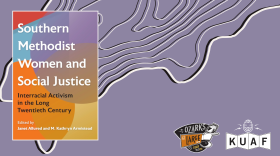Let's start the show on the campus of Northwest Arkansas Community College in Bentonville. The last week before on-campus classes is relatively quiet, but this summer, NWACC is preparing for a pilot micro-credential program launch.
As the name implies, micro-credentials are smaller than the usual two-year degrees offered at the school. Mary Nithya Xavier is micro-credential coordinator at NWACC.
“It places the learner toward a path toward employment, so it's credentials that lead toward employment.”
Micro-credentials are designed to require less than a year to acquire, cost less than a degree, and offer a virtual or on-campus learning experience. The pilot year will offer micro-credentials in three distinct categories: project management, biotechnology, and social and behavioral sciences.
Micro-credentials are intended to allow students to relatively quickly advance skills that could help advance a career, quickly or in the long term.
“We feel that skill-based or skill-focused learning is the key in this age. This program is built on our employer partnerships. We do not build these courses just by our expertise or our knowledge that we have within the institutions. We collaborate with the employers who will engage these learners later on in their journey. We collect the skills that they are looking for, and those skills are getting incorporated into those courses. So this is highly skills-focused. That sets it apart from the usual programs that we offer.”
Completed micro-credential courses lead to something called a digital badge. Think of digital badges as certified recognitions that can be attached to a résumé.
Lucas Paxton, director of digital learning at NWACC, says a lot of this is new, but the concept builds on established programs already at the college.
“If you go over to workforce, we've been doing this for 30 years, right? We engage with the employers, we build it, we do it this way. So part of this is getting the next step into academics. The student wants to come back, and they want to get credit for that and how to make that connection really fluid. Digital badges give us that engine—or, you know, the horse to ride on—to be able to say, okay, these are the list of skills you learned. They match up with these learning objectives and these courses. What else may you need to be academically ready to move on from there? And then how much credit can we give you for those?”
Micro-credentials have a variety of levels and uses. For example, a project management micro-credential can have three parts: a basic course of four weeks that anybody can take, and core and advanced courses—eight and 12 weeks, respectively—for those seeking to advance careers already on a management path.
The NWACC program wasn’t developed in isolation. The school is working with the Arkansas Department of Higher Education; D.C.-based entities Education Design Lab and Credential Engine; area industries; and with support from, among others, the Walton Family Foundation and Walmart Foundation.
Mary Nithya Xavier says this fall’s launch represents two years of research and preparation.
“We didn’t just come up with a course. We did a lot of study on what this area needs. What is the demand? What are the high-demand occupations that this area will need in the next 15, 20 years? And then we identify those jobs, then we build our employer partner relationships, bring them in, tell them what we’re trying to do, and then take their input. So it’s taken us a lot of time trying to get that process straight.”
The micro-credential concept is also becoming incorporated on seven other community college campuses in Arkansas. NWACC is working with Arizona State University, a campus with a few years of micro-credential experience.
Lucas Paxton says even with two years of preparation, the idea might be unfamiliar. But for many students, it can be a way to quickly upskill or sample a deeper academic experience.
“Just to understand that getting those short micro-credentials gets you a job versus, I have a bachelor's degree, why can't I get this job? Or why am I not qualified for this job? Because the industries are starting to look at skills-first hiring. So HR is now adopting this kind of model, and they’re able to use AI to search through people’s résumés and look for skills tags. They're really leveraging that AI component to do that kind of scrubbing that we need to be ready for. As potential employees, we need to know that. We need to have our résumés, and we need to be able to speak to those skills—versus, I have a bachelor’s degree.”
As the new academic year opens, NWACC educators are eager to see how the micro-credentials land with students and area employers. Since the program is regionally targeted, the belief is the digital badges earned with the micro-credential courses can help both a burgeoning workforce and businesses enthusiastic to fill professional roles.
“We hope the students like it, and they enjoy getting their digital badges and being able to put those on their résumés. The next phase is also working with career services on how we get them to use those eloquently—being able to talk about their skills at an interview and get that job, right? So we want to build that next step right into it.
“For us, it's developing more partnerships. We've already got several other areas we want to design micro-credentials. Getting those partnerships built and really letting the region know that we're here for them.”
You can find out more at the website: nwacc.edu.
Ozarks at Large transcripts are created on a rush deadline. Copy editors utilize AI tools to review work. KUAF does not publish content created by AI. Please reach out to kuafinfo@uark.edu to report an issue. The authoritative record of KUAF programming is the audio record.








